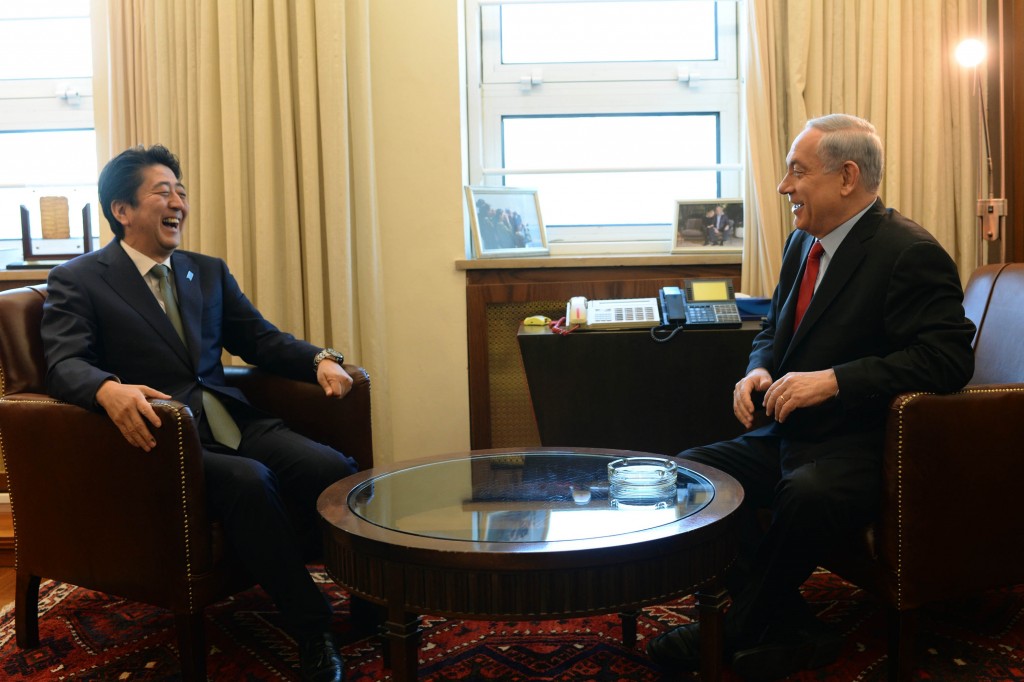
Israel and Japan are growing closer than ever, tied together by a shared desire for trade and their mutual commitment to an international system that is currently under attack. Japanese Prime Minister Shinzo Abe meets with Israeli Prime Minister Benjamin Netanyahu at his office in Jerusalem, on January 19, 2015. Photo: Kobi Gideon / GPO / Flash90
Why is Japan Warming to the Jewish State?
By Aaron Menenberg/The Tower.org
With the Paris terror attacks, the high-profile killing of senior Hezbollah leaders in Syria, and ISIS’s release of a hostage video featuring two kidnapped Japanese nationals monopolizing much of the world’s attention, few noted the significance of Japanese Prime Minister Shinzo Abe’s January 18 visit to Israel—the first by a Japanese PM in over a decade.
And that’s a mistake, because the trip’s goal of improving ties between the two countries is vital to the national security, foreign relations, and economic well-being of both countries. It is a potentially major shift in both policy and perspective for two of the most economic and geopolitically important countries in the Middle East and Asia.
There are good reasons for this shift: Both Israel and Japan face very similar challenges in a changing and, indeed, decaying international system. For Israel, Arab and Islamic countries have been manipulating the international system for decades in order to undermine the Jewish State. They have pieced together an influential coalition of countries and non-governmental organizations (NGOs) to assist them. As a result, so-called human rights institutions at the United Nations have been taken over by undemocratic, theocratic, and grotesquely oppressive countries, often enabled by anti-Israel and sometimes anti-Semitic NGOs. The result is that the international system set up to protect human rights has been co-opted by many of the worst human rights abusers, allowing despots and fanatical terrorist groups to spread instability, death, and poverty throughout their lands.
For Japan, the threat comes from a much larger phenomenon: Countries like China and Russia are systematically undoing the mechanisms that protect national sovereignty and legitimizing a strategy of grand theft territory by undermining values like the right to self-determination and secure, defensible borders. They are successfully pursuing subversive territorial land and sea grabs, such as Russia’s success in quite literally stealing significant parts of Ukraine. Japan is also a primary target of these ambitions. Its success in annexing Crimea has emboldened Russia to step up coercive military pressure on Japan to cede control over the Kuril Islands. China is pursuing a similar strategy toward other Japanese territories.
Due to this systematic effort led by the foes of Israel and Japan, a truly frightening deterioration of international norms is taking place. At the same time, America is taking a step back from principled leadership and Europe is becoming increasingly feeble. Neither seems ready or willing to arrest this deterioration of the international order.
All of this helped lead to Abe’s visit to Israel, which was an official statement of Abe and Netanyahu’s intentions to diversify their foreign relations as a hedge against their enemies’ tactics, boost their economic ties, and build support for their respective security postures. This does indeed represent a major shift in both countries’ foreign policies. Japan has never supported Israel to the extent that many other countries in the Organization for Economic Cooperation and Development have. But now both Israel and Japan are facing a situation in which their adversaries seem to be successfully tipping the scales against them, and they need each other to arrest this threat to their national interests.
This is not simple posturing. These seemingly unnatural allies do in fact have much to benefit from cooperation with each other, and contrary to assumptions, their path toward an alliance is not only important, but quite natural indeed. Both countries appear to understand this. Abe did not arrive in Israel with 100 government officials and heads of Japanese companies for nothing. Abe seems to recognize that a sound Middle East policy includes close relations with Israel. And Netanyahu sees the importance of diversifying Israel’s foreign relations and economic ties, as well as the positive role Japan plays in the world and the opportunities presented by a stronger relationship with it.
In order to understand how Abe came to visit Israel and why the trip is so important to the future of both countries, we need to understand why Abe has become the most-traveled Japanese prime minister in history; indeed, one of the most-traveled leaders of any country. In the two years before his visit to Israel, Abe visited more than 50 countries. There is good reason for this.
Like Netanyahu, Abe is on his second go-around as Japan’s leader. During his six-year absence from the prime minister’s office, Abe watched as Japan lost significant economic and diplomatic clout. Once considered an economic miracle, Japan has slipped from second to third on the list of the world’s largest economies, while its geopolitical influence has waned in the face of economic stagnation and China’s rise to the status of regional hegemon.
Upon his return to power, Abe set out to achieve three goals: improving Japan’s economy, national security, and diplomatic position. As a result, Abe has pushed through major economic and security reforms, and embarked on his unprecedented round of diplomatic travel. According to the Carnegie Endowment’s James Schoff, Abe is seeking to sell Japan as a country relevant to global policy issues like technology, the environment, diplomacy, economics, and security. In so doing, Abe is working to make Japan relevant, even though it cannot be as militarily active as other nations. Part of Abe’s pitch to foreign leaders is that Japan is a better partner in Asian trade and diplomacy than China, and the leading representative of Asia in the international community.
To continue reading this article on the site, Click Here
Why is Japan Warming to the Jewish State?








